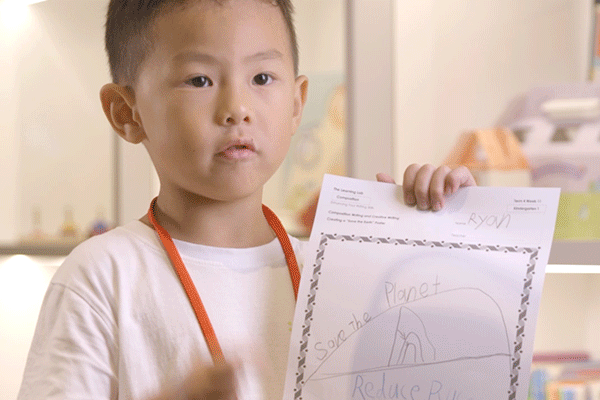
In her last will and testament, humanitarian Mary Mcleod Bethune wrote that “we have a powerful potential in our youth, and we must have the courage to change old ideas and practices so that we may direct their power toward good ends”.
Nearly 65 years later, Dr. Bethune’s wishes for an inspired youth have been fulfilled by Greta Thunberg, a Swedish teenager of 16, who was recently crowned TIME Magazine’s 2019 Person of the Year.
Greta attained global recognition in late 2018 when she spearheaded school strikes and public speeches regarding the issue of climate change.
Her sharp and insightful commentary on the inaction of world governments polarised public opinion, but her overarching message was widely supported: We need to start looking after our home, we need to do it better and we need to act fast.
Within weeks of Greta Thunberg becoming a household name, she has addressed the heads of the United Nations, met with the Pope, and inspired four million people to join the global climate strike on September 20, 2019 — the largest climate demonstration in human history.
Through all that she has achieved, it is worth remembering that Greta is still just a teenager. She is fresh, hopeful and driven, unshaken by the perceived impossibilities and cynicism of her elders. There is a lot to be learned from her, her cause and her journey.
Here are some lessons from Greta's experience that you can reinforce in your child, inspired by a young visionary and leader.

1. Being Different
is a Superpower
Greta has spoken publicly about how she personally deals with Asperger syndrome (AS), obsessive-compulsive disorder (OCD) and selective mutism (SM).
AS is a developmental disorder characterised by significant difficulties in social interaction and nonverbal communication, along with restricted and repetitive patterns of behaviour and interests.
SM is an anxiety disorder in which a person who is normally capable of speech cannot speak in specific situations or to specific people.
These conditions seem all too limiting, but Greta has sought to prove that limits are a choice, whether imposed by ourselves or by those around us. In a tweet, she shared: “I have Asperger’s and that means I’m sometimes a bit different from the norm. And — given the right circumstances — being different is a superpower. #aspiepower”
She fiercely stands by her belief that Asperger’s is her “superpower”, allowing her to cut through the noise and get at the heart of the issue.
It is not easy being a teenager. Aside from dealing with hormonal changes, teens may feel inhibited to embrace their unique traits as a result of societal dogma, and may tend to simply cover up who they are so they can be seen as cool, “socially acceptable” or “politically correct”.
This can apply to younger children as well. Too many times, children feel pressured to fit into a mould, or behave and speak in a certain manner. Developing a sense of identity is an important developmental process that you can actively be a part of to shape your child into the best he or she can be.
Start by getting your child to embrace his or her unique traits. You can ask your child to write down a list of attributes that makes him or her stand out from the rest of his or her peers. After which, you can go through the list and brainstorm about various ways that your child can work those particular traits to his or her advantage.
For example, your child may be hyperactive. Hyperactivity may seem like a less than desirable characteristic, but many people diagnosed with attention deficit hyperactivity disorder (ADHD) have proven to thrive from this condition.
People with ADHD often demonstrate spontaneity, curiosity and enthusiasm. With this as an example, you can explain to your child how his or her characteristics, however seemingly negative, can be viewed as a constructive element for his or her personal development, and are part of how he or she can be the best version of himself or herself.

2. Rise Above Negativity
Greta has had her fair share of cynics criticising her every move. “The haters are as active as ever,” she shared on social media, “going after me, my looks, my clothes, my behaviour and my differences.”
Climate change deniers have also accused her of virtue signalling, of catastrophising and of fearmongering to a generation of impressionable children.
In response to these accusations, Greta argued that for her and her supporters, the end of the world is not some distant threat.
She believes that it poses an imminent danger unless major moves are made by the world’s most powerful leaders.
“It seems they will cross every possible line to avert the focus, since they are so desperate not to talk about the climate and ecological crisis,” Greta mused in a tweet.
The backlash against Greta was not entirely unexpected, although brutal on some fronts. As one journalist from the Irish Examiner newspaper wrote: “Nobody likes a guilt trip and nobody likes to be told what to do or how to think, and they certainly do not like when you do any of those three things while laced with potent emotion.”
Influential figures, including the likes of Donald Trump, Melania Trump, Piers Morgan and Jeremy Clarkson, have also tried to derail the traction that Greta’s stance on the climate crisis is gaining.
She has been branded a “spoilt brat”, an “idiot”, and a “weird Swede with a bad temper” by TV presenter Jeremy Clarkson. Meanwhile in response to Greta being honoured as TIME’s Person of the Year, Donald Trump tweeted: “So ridiculous. Greta must work on her Anger Mangement problem, then go to a good old fashioned movie with a friend! Chill, Greta, Chill!”
Greta has taken all the criticisms in her stride and with a tongue-in-cheek approach. In defiance to Trump’s offensive comment, Greta cheekily changed her Twitter bio to: “A teenager working on her anger management problem. Currently chilling and watching a good old fashioned movie with a friend.”
We have to applaud Greta’s ability to “shake it off” (in the wise words of Taylor Swift). Despite the thousands of haters and critics who try to tear her down, she has not given them the power to upset her, and continues forging ahead with her climate change crusade.
Your child can learn a thing or two from Greta’s determination in persevering with her cause in the face of malevolent and venomous criticisms.
It may be difficult to accept that the world can be a harsh and terrifying place full of resentful people waiting to tear your child down at any point. Whatever your child does, there will always be haters or people who will find a reason to project their insecurities, negativity or fears onto your child, and he or she will have to learn to deal with it.
You can enlighten your child to the concept that no one has the power to upset him or her, unless he or she allows it. He or she has the prerogative to choose how he or she reacts under these circumstances.
It is better for your child to focus on the road ahead and move toward his or her goals, speeding past all the negativity and criticism that can threaten to derail his or her objectives.

3. Powerful Messages
Can Be Delivered by
Anyone at Any Age
Greta has accomplished more in her 16 years of life than most people have by the time they reach 30. The Swedish climate change activist proved to the entire world that age is just a number after setting a record for being the youngest ever to be crowned ‘Person of the Year’ by TIME Magazine.
“I don’t care about age. Nor do I care about those who do not accept the science. I don’t have much experience, and therefore I listen more,” Greta professed. “But I also have the right to express my opinion, no matter my age. Being young is a great advantage, since we see the world from a new perspective and we are not afraid to make radical changes.”
At the tender age of 16, Greta stands at the head of a peaceful campaign to clean up the planet. Alongside her are many up-and-coming youth leaders who are poised to make huge changes to the world around them.
Whether it’s through social media, writing about their views in an article or giving speeches, there are many ways that young people can make a difference to the world.
The youth of today are a limitless source of innovative energy who are able to provide critical insights and perspectives on various issues. They are our leaders of tomorrow, and encouraging them to speak up and speak out can inspire a generation of lifelong changemakers.
Whether he or she is 6 or 16 years old, your child has the potential to spur change. He or she can even start small by talking to friends and family or voicing his or her opinions in an online forum. Your child should not underestimate the power of his or her voice.
Give your child the support he or she needs to make proactive choices or kickstart his or her own social ventures. Children deserve the chance to explore and address the problems they see around them. The positive effects of changemaking can spill over into adulthood as they feel empowered and motivated to help others or pursue their goals with confidence.
Enlightening Young Minds
for a Brighter Future
At The Learning Lab, we strive to keep our students in touch with global trends and movements, such as the recent rise in awareness regarding progressive environmental advances across industries.
In the words of UN Secretary-General António Guterres, “young people tend to have a fantastic impact in public opinion around the world.”
We strongly believe in nurturing young minds that are not only book-smart, but also capable of reflecting on complex issues. In our Kindergarten English classes, for example, our students have recently been learning about climate change, where they create their own posters and slogans to champion various causes.
You can check out the video highlights of that lesson here. And if you like what you see, why not check out our full slate of classes in 2020? Your vision for your child’s education can be 20/20 for the year 2020.
The Learning Lab is now at locations. Find a location that suits your needs.
If you have any questions about our range of programmes or class schedules, you may contact us at 6733 8711 or drop us an email at enquiry@thelearninglab.com.sg.



